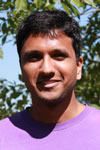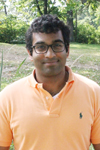Student Advocacy & Involvement
Udaysankar Chockanathan (he/him), M3
 What are you passionate about?
What are you passionate about?
Rhetoric around climate change often centers on the idea of saving the planet. But while the dangers of a warming planet will affect everyone, they won’t be felt by everyone equally; women, people of color, children, and the working class will bear the brunt of these burdens. Furthermore, the fossil fuel corporations that are responsible for the climate crisis will use their wealth to protect themselves against its effects while simultaneously blocking progress toward decarbonization.
For these reasons, I believe that any conversation about climate change must also include discussions of equity and justice. To advocate for climate justice in Rochester, I joined the Rochester for Energy Democracy (RED) campaign, which seeks to replace our for-profit utility with a democratically controlled public utility. With organizations like RED, we can move beyond the idea of simply “saving the planet” to ask “For whom? And from whom?”
What does advocacy look like to you in your experience as a MD-PhD candidate?
I was initially hesitant to jump into the world of advocacy, mostly due to my fear that I did not have the right skill set for it. Upon joining RED, however, I was surprised to learn how much of the analytical and communication skills I had acquired in graduate school could be applied to activism. For example, reading advanced scientific literature prepared me well for extracting useful information from corporate financial statements and regulatory filings in the utility sector. Moreover, drawing on my experience making figures for scientific manuscripts, I was able to consolidate this complex information into easily understandable infographics for the general public.
You can view Uday's RED infographics here.
Rohith Palli (he/him), Resident, Internal Medicine at URMC; MSTP Graduate 2022
What are you passionate about?
In short, empowering others to become activists. I am passionate about building relationships between the local community and the URMC community, which in itself is a great resource and in turn will allow for high impact within URMC. Rochester is a great city to learn and engage with the many local activists to help build the movement.
Why should physician-scientists get involved in advocacy work?
We often talk about how physician-scientists have two prongs, medicine and scientific research, but I argue we should actually be triple-pronged; the third being activism. We talk about how physician-scientists bring medical knowledge to other researchers and research knowledge to other healthcare workers, but we are also in a position to take what we learn about advocacy and bring it to both spaces. It is important to balance our three hats -- and also recognize that we are not experts in advocacy, that there are others who do this full-time, so we have a lot to learn from them. Our Students for a National Health Program (SNaHP) Chapter has grown largely due to the ongoing efforts of Rochester's community organization Metro Justice in part. I think that the level of access our training affords us is a privilege that can be used to uplift and empower others while creating community and that community is what ultimately keeps our advocacy sustainable.
Mike Sportiello (he/him), G4
 What are you passionate about?
What are you passionate about?
The profit motive has pit fellow community members against each other fighting for scarce jobs or payment instead of collaborating to build a world in which all of our needs are met including housing, food, and healthcare. I'm passionate about dismantling this system that works to view fellow people as sources of revenue instead of partners in building a future for all of us.
Why should we engage in advocacy work as physician-scientist trainees?
Today's profound inequality, exacerbated by the fact that it is inflicted with purposeful racialized effects, is greater today than it has been for many decades. As healthcare providers, we see the profound effects this has on our patients' health every single day. By participating in advocacy as physician scientist trainees, we can break down barriers between systems of power and the people most affected by this inequality, who wield less of it. Physicians have always received inter-class social capital due to the nature of our work. Using this power for good is not simply an opportunity, but a necessity. There have been many opportunities to get involved thus far, beyond the administration of healthcare to those under or uninsured: it was a student-led effort that shut down our hospital system’s clinics for the rich, where special "VIP Patients" were given special access and better healthcare than the average patient. Other opportunities to get involved include local groups working to establish Medicare for All and supervised injection sites for people using illicit drugs, which has been shown to decrease overdose and increase rate of detoxification program entry.
Thank you to Nora Gilliam (they/she), M1 for compiling these biographies in order to highlight the advocacy work of our students.